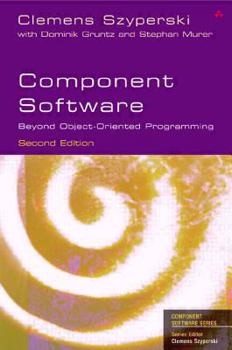Component Software
An update to the definitive and Jolt award winning guide to component technologies written by the leading international expert in the area. This description may be from another edition of this product.
Format:Hardcover
Language:English
ISBN:0201745720
ISBN13:9780201745726
Release Date:January 2002
Publisher:Addison-Wesley Professional
Length:450 Pages
Weight:2.25 lbs.
Dimensions:1.3" x 6.0" x 9.8"
Related Subjects
Computer Science Computers Computers & Technology Education & Reference Mathematics Object-Oriented Design Object-Oriented Software Design Programming Languages Science & Math Software Software Design & Engineering Software Design, Testing & Engineering Software Development Software EngineeringCustomer Reviews
5 ratings
Great Book!
Published by Thriftbooks.com User , 25 years ago
It was refreshing to read a book with objective analysis without any marketing hype and propaganda that you find in other books in the market. I particularly liked the section where the author gives an unbiased comparison of COM/DCOM, CORBA, and JavaBean.
Excellent book
Published by Thriftbooks.com User , 26 years ago
I am relatively new to "components" and after reading a few disappointing books, I found this gem of a book quite by chance. This is not your typical introductory fluffy book - it is very technical and detailed in parts, but provides a good roadmap for beginning readers who want just an overview before digging into thte details. Besides providing a good perspective about Java, Corba, COM etc., the unique thing about this book is that the author also discusses their differences from two different perspectives - the technical (academic) differences and the "real-world" differences (i.e. how they impact your software infrastructure. Very well-written (dont be put off by a typo in the very sentence of chapter 1 - its the only typo I noticed)
A new bible for component designers, developers, and users.
Published by Thriftbooks.com User , 26 years ago
Szyperski's book discusses component software from an unusual point of view: as an academic and a professional. This perspective provides the reader with the best of both worlds: a discussion of essential academic object and component concepts as well as a pragmatic review of existing component systems. In particular, the important topics that Szyperski covers include callbacks and their impact on reuse, reentrant code, component interface specification with contracts, subtyping (co/contravariance), code and behavioral inheritance, and finally safety and progress specifications. Each of these topics is critical to the development of robust and reusable components. Szyperski's discussion of todays' component frameworks (loosely, CORBA, COM, and Java) shows his biases, but they are objectively justified. Finally, the author discusses the next generation of component architectures. Included in this discussion is a brief foray into OpenDoc! , a discussion of Oberon Microsystems' BlackBox component framework, and Portos and Denia, two hard realtime component frameworks. Any designer or developer that uses or builds components must read this book. It will help the good component designer/developer/manager become a _great_ component thinker.
Insightful analysis of software components
Published by Thriftbooks.com User , 26 years ago
A beautifully written and researched book, Component Software is a fascinating study of the practical aspects of making components work in software development. Touching on Java, CORBA, COM, architectures, frameworks, component assembly, domain standards and much more, the author gives the reader an impressive panaroma of the state-of-the-art in component technology.....But this doesn't do justice to the expressiveness, insight, and impressive range of integration between fields of component study that Szyperski puts into this book. You will not find a more useful addition to your library about component technology and we recommend it strongly. -- Object News Book Reviews
The definitive text for component software
Published by Thriftbooks.com User , 26 years ago
If found this book very enlightening. It is the first book I have seen that discusses component oriented software in a real world way. Mind you this is a text book, not your typical programming book, so some of its appeal will be limited. However, for anyone doing any serious thinking about component software this book is a must read. The author (one of the principles behind Oberon and Component Pascal) very carefully avoids taking explicit sides in the so-called "component wars" (the same cannot be said about his stance on objects v. components, he clearly believes OO has failed to live up to its promises). However, I think the book is (indirectly) about Microsoft's COM in that it explains, in a very detailed, academic sort of way, the same principles that are behind COM. I don't think the author intended to write a book about COM, it's just that his ideas and the ideas of the designers of COM appear to be very similar. At 28 chapters & 411 pages this is a long book. It covers a lot of material. Some parts are pretty hard to read because they are so academically grounded. The author recognizes this and warns the reader beforehand. Most of the sections I found hard to read could easily be skipped over without detracting from the real value the book provides.





